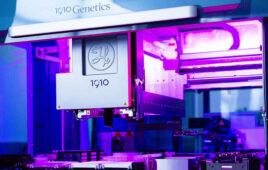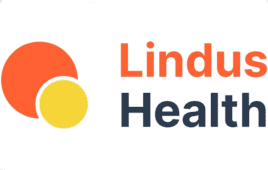
Simplified schematic illustration showing the proposed mechanism of action of FcRn inhibitors. The left side illustrates how IgG molecules enter cells and interact with the neonatal Fc receptors (FcRn), and the right side depicts the impact of FcRn inhibitors on this process. Image by Benff, licensed under [CC BY-SA 4.0], via Wikimedia Commons. Modified from D.D. Patel, J.B. Bussel’s work.
Source: Driehaus Capital Management LLC (data as of June 2020), Bloomberg, and Truist (2023 projections).
Efgartigimod: Multi-billion dollar projections in autoimmune treatment
In a recent study in The Lancet, the neonatal Fc receptor inhibitor efgartigimod from Argenx demonstrated potential as a groundbreaking treatment for primary immune thrombocytopenia (ITP). Beyond its recognized indications, efgartigimod is also showing promise in other severe autoimmune conditions, including Thyroid Eye Disease (TED), ANCA-associated vasculitis, and antibody-mediated rejection (AMR). With the FcRn market continuing to show promise for various autoimmune diseases, Bloomberg’s consensus forecasts sales for efgartigimod to be $8.3 billion by 2033 while Truist analysts project a slightly higher figure of $8.5 billion in 2033 for just four modeled indications: generalized myasthenia gravis (gMG), pemphigus vulgaris (PV), immune thrombocytopenia (ITP), and chronic inflammatory demyelinating polyneuropathy (CIDP). The drug scored its FDA approval in late 2021 for the treatment of generalized myasthenia gravis. By the end of this year, Argenx anticipates efgartigimod to either be approved, under regulatory review, or in development for 13 severe autoimmune diseases.
Nipocalimab: A contender for multiple autoimmune diseases
Also belonging to the FcRn inhibitor class, Johnson & Johnson is framing nipocalimab as a pipeline in a pathway, and has hinted that the drug could score regulatory approvals for several indications in the coming years, some of which could top $1 billion. As of July 20, 2023, J&J noted that the drug was in various stages of clinical trials, including Phase 3 for conditions such as warm autoimmune hemolytic anemia and chronic inflammatory demyelinating polyneuropathy, and phase 2 for diseases such as Sjogren’s syndrome, systemic lupus erythematosus, and rheumatoid arthritis. In June, J&J revealed positive results from the Phase 2 UNITY clinical trial of nipocalimab in pregnant individuals at high risk of early-onset severe hemolytic disease of the fetus and newborn (HDFN), a condition that can lead to fetal anemia. Current treatment options for the condition include intrauterine transfusion, early delivery and a variety of postnatal treatments.
IMVT-1402: A potential best-in-class FcRn inhibitor with encouraging Phase 1 data
Another contender in the FcRn inhibitor market is Immunovant’s IMVT-1402. Billed by its developer as a “a potential best-in-class neonatal fragment crystallizable receptor (FcRn) inhibitor,” IMVT-1402 recently yielded dose-dependent reductions in IgG in initial data from a phase 1 clinical trial in healthy adult when administered subcutaneously. Although still in its early stages and facing questions regarding its dose-response and impact on LDL cholesterol levels, the Phase 1 clinical trial demonstrated that the 300 mg subcutaneous dose led to a consistent reduction in IgG levels, comparable to that of batoclimab, without observing any increase in LDL cholesterol above baseline. The trial found no significant drop in serum albumin below baseline, a positive indicator for IMVT-1402’s safety profile. With the initiation of the 600 mg dosing underway, forthcoming data from this cohort could shed light on the response of the bigger dose on LDL.
Immunovant is closely linked with Roivant Sciences, which is developing batoclimab (see below). In fact, Roivant is a major shareholder in Immunovant, and in August 2021, invested $200 million to support the development of IMVT-1401.
Rozanolixizumab
UCB’s rozanolixizumab, marketed as Rystiggo, won FDA approval in June 2023 to treat adults with generalized myasthenia gravis (gMG) who are anti-acetylcholine receptor (AChR) or anti-muscle-specific tyrosine kinase (MuSK) antibody positive. As the FcRn inhibitor landscape becomes more competitive, it’s noteworthy to compare UCB’s rozanolixizumab and argenx’s efgartigimod. Both drugs are making strides in similar conditions such as gMG and CIDP, showcasing the growing potential and fierce competition in this space. In addition, rozanolixizumab recently scored approval in Japan for the treatment of adults with generalized myasthenia gravis (gMG) who inadequately respond to steroids or other immunosuppressants. Clinical trials for rozanolixizumab are underway for CIDP and encephalitis. Preliminary data is positive.
Batoclimab
Roivant’s batoclimab is another key player in the evolving FcRn inhibitor market. Batoclimab is the company’s first-generation asset. Recent studies and clinical trials have showcased batoclimab’s potential efficacy and safety profiles. Earlier this year, Roivant announced positive results from a Phase 3 clinical trial in China, revealing that the drug candidate successfully eased the symptoms of generalized myasthenia gravis (gMG) and improved daily function, meeting both primary and secondary endpoints. In addition to gMG, Roivant is pursuing indications for batoclimab for thyroid eye disease, warm autoimmune hemolytic anemia (WAIHA), chronic inflammatory demyelinating polyneuropathy (CIDP), and Graves’ disease.
Filed Under: Biologics, clinical trials, Drug Discovery, Hematology, Immunology, Regulatory affairs



